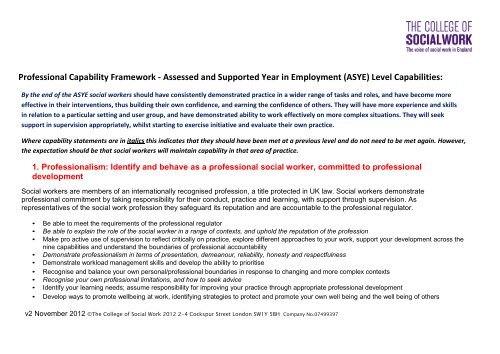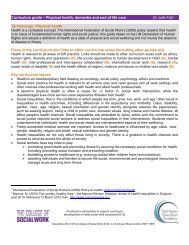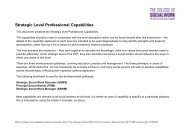PCF capabilities - ASYE - The College of Social Work
PCF capabilities - ASYE - The College of Social Work
PCF capabilities - ASYE - The College of Social Work
Create successful ePaper yourself
Turn your PDF publications into a flip-book with our unique Google optimized e-Paper software.
Pr<strong>of</strong>essional Capability Framework - Assessed and Supported Year in Employment (<strong>ASYE</strong>) Level Capabilities:<br />
By the end <strong>of</strong> the <strong>ASYE</strong> social workers should have consistently demonstrated practice in a wider range <strong>of</strong> tasks and roles, and have become more<br />
effective in their interventions, thus building their own confidence, and earning the confidence <strong>of</strong> others. <strong>The</strong>y will have more experience and skills<br />
in relation to a particular setting and user group, and have demonstrated ability to work effectively on more complex situations. <strong>The</strong>y will seek<br />
support in supervision appropriately, whilst starting to exercise initiative and evaluate their own practice.<br />
Where capability statements are in italics this indicates that they should have been met at a previous level and do not need to be met again. However,<br />
the expectation should be that social workers will maintain capability in that area <strong>of</strong> practice.<br />
1. Pr<strong>of</strong>essionalism: Identify and behave as a pr<strong>of</strong>essional social worker, committed to pr<strong>of</strong>essional<br />
development<br />
<strong>Social</strong> workers are members <strong>of</strong> an internationally recognised pr<strong>of</strong>ession, a title protected in UK law. <strong>Social</strong> workers demonstrate<br />
pr<strong>of</strong>essional commitment by taking responsibility for their conduct, practice and learning, with support through supervision. As<br />
representatives <strong>of</strong> the social work pr<strong>of</strong>ession they safeguard its reputation and are accountable to the pr<strong>of</strong>essional regulator.<br />
• Be able to meet the requirements <strong>of</strong> the pr<strong>of</strong>essional regulator<br />
• Be able to explain the role <strong>of</strong> the social worker in a range <strong>of</strong> contexts, and uphold the reputation <strong>of</strong> the pr<strong>of</strong>ession<br />
• Make pro active use <strong>of</strong> supervision to reflect critically on practice, explore different approaches to your work, support your development across the<br />
nine <strong>capabilities</strong> and understand the boundaries <strong>of</strong> pr<strong>of</strong>essional accountability<br />
• Demonstrate pr<strong>of</strong>essionalism in terms <strong>of</strong> presentation, demeanour, reliability, honesty and respectfulness<br />
• Demonstrate workload management skills and develop the ability to prioritise<br />
• Recognise and balance your own personal/pr<strong>of</strong>essional boundaries in response to changing and more complex contexts<br />
• Recognise your own pr<strong>of</strong>essional limitations, and how to seek advice<br />
• Identify your learning needs; assume responsibility for improving your practice through appropriate pr<strong>of</strong>essional development<br />
• Develop ways to promote wellbeing at work, identifying strategies to protect and promote your own well being and the well being <strong>of</strong> others<br />
v2 November 2012 ©<strong>The</strong> <strong>College</strong> <strong>of</strong> <strong>Social</strong> <strong>Work</strong> 2012 2-4 Cockspur Street London SW1Y 5BH Company No.07499397
• Identify and implement strategies for responding appropriately to concerns about practice or procedures, seeking guidance if required<br />
2. Values and Ethics: Apply social work ethical principles and values to guide pr<strong>of</strong>essional practice<br />
<strong>Social</strong> workers have an obligation to conduct themselves ethically and to engage in ethical decision-making, including through partnership<br />
with people who use their services. <strong>Social</strong> workers are knowledgeable about the value base <strong>of</strong> their pr<strong>of</strong>ession, its ethical standards and<br />
relevant law.<br />
• Understand and apply the pr<strong>of</strong>ession’s ethical principles and legislation, taking account <strong>of</strong> these in reaching decisions<br />
• Recognise, and manage the impact <strong>of</strong> your own values on pr<strong>of</strong>essional practice<br />
• Recognise and manage conflicting values and ethical dilemmas to arrive at principled decisions<br />
• Demonstrate respectful partnership work with service users and carers, eliciting and respecting their needs and views, and promoting<br />
their participation in decision-making wherever possible<br />
• Recognise and promote individuals’ rights to autonomy and self-determination<br />
• Promote and protect the privacy <strong>of</strong> individuals within and outside their families and networks, recognising the requirements <strong>of</strong><br />
pr<strong>of</strong>essional accountability and information sharing<br />
3. Diversity: Recognise diversity and apply anti-discriminatory and anti-oppressive principles in practice<br />
<strong>Social</strong> workers understand that diversity characterises and shapes human experience and is critical to the formation <strong>of</strong> identity. Diversity is<br />
multi- dimensional and includes race, disability, class, economic status, age, sexuality, gender and transgender, faith and belief. <strong>Social</strong><br />
workers appreciate that, as a consequence <strong>of</strong> difference, a person’s life experience may include oppression, marginalisation and alienation as<br />
well as privilege, power and acclaim, and are able to challenge appropriately.<br />
• Identify and take account <strong>of</strong> the significance <strong>of</strong> diversity and discrimination on the lives <strong>of</strong> people, and show application <strong>of</strong> this<br />
understanding in your practice<br />
v2 November 2012 ©<strong>The</strong> <strong>College</strong> <strong>of</strong> <strong>Social</strong> <strong>Work</strong> 2012 2-4 Cockspur Street London SW1Y 5BH Company No.07499397
• Recognise oppression and discrimination by individuals or organisations and implement appropriate strategies to challenge<br />
• Identify the impact <strong>of</strong> the power invested in your role on relationships and your intervention, and be able to adapt your practice accordingly<br />
4. Rights, Justice and Economic Wellbeing:<br />
Advance human rights and promote social justice and economic well-being<br />
<strong>Social</strong> workers recognise the fundamental principles <strong>of</strong> human rights and equality, and that these are protected in national and international<br />
law, conventions and policies. <strong>The</strong>y ensure these principles underpin their practice. <strong>Social</strong> workers understand the importance <strong>of</strong> using and<br />
contributing to case law and applying these rights in their own practice. <strong>The</strong>y understand the effects <strong>of</strong> oppression, discrimination and<br />
poverty.<br />
• Begin to integrate principles <strong>of</strong> and entitlements to social justice, social inclusion and equality in your analysis and practice, by identifying factors<br />
that contribute to inequality and exclusion, and supporting people to pursue options to enhance their well being<br />
• Address oppression and discrimination applying the law to protect and advance people’s rights, recognising how legislation can constrain or<br />
advance these rights<br />
• Apply in practice principles <strong>of</strong> human, civil rights and equalities legislation, and manage competing rights, differing needs and perspectives<br />
• Recognise the impact <strong>of</strong> poverty and social exclusion and promote enhanced economic status through access to education, work, housing,<br />
health services and welfare benefit<br />
• Empower service users and carers through recognising their rights and enable access where appropriate to independent advocacy<br />
5. Knowledge: Apply knowledge <strong>of</strong> social sciences, law and social work practice theory<br />
<strong>Social</strong> workers understand psychological, social, cultural, spiritual and physical influences on people; human development throughout the<br />
life span and the legal framework for practice. <strong>The</strong>y apply this knowledge in their work with individuals, families and communities. <strong>The</strong>y<br />
know and use theories and methods <strong>of</strong> social work practice.<br />
• Consolidate, develop and demonstrate comprehensive understanding and application <strong>of</strong> the knowledge gained in your initial training, and<br />
v2 November 2012 ©<strong>The</strong> <strong>College</strong> <strong>of</strong> <strong>Social</strong> <strong>Work</strong> 2012 2-4 Cockspur Street London SW1Y 5BH Company No.07499397
3<br />
knowledge related to your specialist area <strong>of</strong> practice, including critical awareness <strong>of</strong> current issues and new evidence-based practice research<br />
• Demonstrate knowledge and application <strong>of</strong> appropriate legal and policy frameworks and guidance that inform and mandate social work practice.<br />
Apply legal reasoning, using pr<strong>of</strong>essional legal expertise and advice appropriately, recognising where scope for pr<strong>of</strong>essional judgement exists.<br />
• Demonstrate and apply to practice a working knowledge <strong>of</strong> human growth and development throughout the life course<br />
• Recognise the short and long term impact <strong>of</strong> psychological, socio-economic, environmental and physiological factors on people’s lives, taking<br />
into account age and development, and how this informs practice<br />
• Recognise how systemic approaches can be used to understand the person-in-the-environment and inform your practice<br />
• Acknowledge the centrality <strong>of</strong> relationships for people and the key concepts <strong>of</strong> attachment, separation, loss, change and resilience<br />
Understand forms <strong>of</strong> harm and their impact on people, and the implications for practice, drawing on concepts <strong>of</strong> strength, resilience, vulnerability, risk<br />
and resistance, and apply to practice<br />
• Demonstrate a critical knowledge <strong>of</strong> the range <strong>of</strong> theories and models for social work intervention with individuals, families, groups and<br />
communities, and the methods derived from them<br />
• Demonstrate a critical understanding <strong>of</strong> social welfare policy, its evolution, implementation and impact on people, social work, other pr<strong>of</strong>essions,<br />
and inter-agency working<br />
• Recognise the contribution, and begin to make use, <strong>of</strong> research to inform practice<br />
• Demonstrate a critical understanding <strong>of</strong> research methods<br />
• Value and take account <strong>of</strong> the expertise <strong>of</strong> service users, carers and pr<strong>of</strong>essionals<br />
6. Critical reflection and Analysis - Apply critical reflection and analysis to inform and provide a rationale<br />
for pr<strong>of</strong>essional decision-making<br />
<strong>Social</strong> workers are knowledgeable about and apply the principles <strong>of</strong> critical thinking and reasoned discernment. <strong>The</strong>y identify, distinguish,<br />
evaluate and integrate multiple sources <strong>of</strong> knowledge and evidence. <strong>The</strong>se include practice evidence, their own practice experience, service<br />
user and carer experience together with research-based, organisational, policy and legal knowledge. <strong>The</strong>y use critical thinking augmented by<br />
creativity and curiosity.<br />
• Show creativity in tackling and solving problems, by considering a range <strong>of</strong> options to solve dilemmas.<br />
v2 November 2012 ©<strong>The</strong> <strong>College</strong> <strong>of</strong> <strong>Social</strong> <strong>Work</strong> 2012 2-4 Cockspur Street London SW1Y 5BH Company No.07499397
• Use reflective practice techniques to evaluate and critically analyse information, gained from a variety <strong>of</strong> sources, to construct and test hypotheses<br />
and make explicit evidence-informed decisions<br />
7. Intervention and Skills: Use judgement and authority to intervene with individuals, families and communities<br />
to promote independence, provide support and prevent harm, neglect and abuse<br />
<strong>Social</strong> workers engage with individuals, families, groups and communities, working alongside people to assess and intervene. <strong>The</strong>y enable<br />
effective relationships and are effective communicators, using appropriate skills. Using their pr<strong>of</strong>essional judgement, they employ a range<br />
<strong>of</strong> interventions: promoting independence, providing support and protection, taking preventative action and ensuring safety whilst balancing<br />
rights and risks. <strong>The</strong>y understand and take account <strong>of</strong> differentials in power, and are able to use authority appropriately. <strong>The</strong>y evaluate their<br />
own practice and the outcomes for those they work with.<br />
• Use a range <strong>of</strong> methods to engage and communicate effectively with service users, eliciting the needs, wishes and feelings <strong>of</strong> all those involved,<br />
taking account <strong>of</strong> situations where these are not explicitly expressed<br />
• Demonstrate clear communication <strong>of</strong> evidence-based pr<strong>of</strong>essional reasoning, judgements and decisions, to pr<strong>of</strong>essional and nonpr<strong>of</strong>essional<br />
audiences<br />
• Build and use effective relationships with a wide range <strong>of</strong> people, networks, communities and pr<strong>of</strong>essionals to improve outcomes, showing an ability<br />
to manage resistance<br />
• Use appropriate assessment frameworks, applying information gathering skills to make and contribute to assessments, whilst continuing to<br />
build relationships and <strong>of</strong>fer support<br />
• Select, use and review appropriate and timely social work interventions, informed by evidence <strong>of</strong> their effectiveness, that are best suited to the<br />
service user(s), family, carer, setting and self<br />
• Use a planned and structured approach, informed by social work methods, models and tools, to promote positive change and independence and<br />
to prevent harm<br />
• Recognise how the development <strong>of</strong> community resources, groups and networks enhance outcomes for individuals<br />
• Record information in a timely, respectful and accurate manner. Write records and reports, for a variety <strong>of</strong> purposes with language suited to<br />
function, using information management systems. Distinguish fact from opinion, and record conflicting views and perspectives<br />
• Share information consistently in ways that meet legal, ethical and agency requirements<br />
• Recognise complexity, multiple factors, changing circumstances and uncertainty in people’s lives, be able to prioritise your intervention<br />
• Use authority appropriately in your role<br />
v2 November 2012 ©<strong>The</strong> <strong>College</strong> <strong>of</strong> <strong>Social</strong> <strong>Work</strong> 2012 2-4 Cockspur Street London SW1Y 5BH Company No.07499397
• Demonstrate understanding <strong>of</strong> and respond to risk factors in your practice. Contribute to the assessment and management <strong>of</strong> risk, including<br />
strategies for reducing risk, distinguishing levels <strong>of</strong> risk for different situations<br />
• Demonstrate application <strong>of</strong> principles and practice for safeguarding adults and children including consideration <strong>of</strong> potential abuse. Apply strategies<br />
that aim to reduce and prevent harm and abuse<br />
8. Contexts and organisations: Engage with, inform, and adapt to changing contexts that shape practice. Operate<br />
effectively within own organisational frameworks and contribute to the development <strong>of</strong> services and<br />
organisations. Operate effectively within multi-agency and inter-pr<strong>of</strong>essional partnerships and settings<br />
<strong>Social</strong> workers are informed about and pro-actively responsive to the challenges and opportunities that come with changing social contexts<br />
and constructs. <strong>The</strong>y fulfil this responsibility in accordance with their pr<strong>of</strong>essional values and ethics, both as individual pr<strong>of</strong>essionals and as<br />
members <strong>of</strong> the organisation in which they work. <strong>The</strong>y collaborate, inform and are informed by their work with others, inter-pr<strong>of</strong>essionally and<br />
with communities.<br />
5<br />
• Taking account <strong>of</strong> legal, operational and policy contexts, proactively engage with your own organisation and contribute to its evaluation<br />
and development<br />
• Proactively engage with colleagues, and a range <strong>of</strong> organisations to identify, assess, plan and support to the needs <strong>of</strong> service users and<br />
communities<br />
• Understand legal obligations, structures and behaviours within organisations and how these impact on policy, procedure and practice<br />
• Be able to work within an organisation’s remit and contribute to its evaluation and development<br />
• Understand and respect the role <strong>of</strong> others within the organisation and work effectively with them<br />
• <strong>Work</strong> effectively as a member <strong>of</strong> a team, demonstrating the ability to develop and maintain appropriate pr<strong>of</strong>essional and inter-pr<strong>of</strong>essional<br />
relationships, managing challenge and conflict with support<br />
9. Pr<strong>of</strong>essional Leadership: Take responsibility for the pr<strong>of</strong>essional learning and development <strong>of</strong> others through<br />
supervision, mentoring, assessing, research, teaching, leadership and management<br />
v2 November 2012 ©<strong>The</strong> <strong>College</strong> <strong>of</strong> <strong>Social</strong> <strong>Work</strong> 2012 2-4 Cockspur Street London SW1Y 5BH Company No.07499397
<strong>The</strong> social work pr<strong>of</strong>ession evolves through the contribution <strong>of</strong> its members in activities such as practice research, supervision, assessment <strong>of</strong><br />
practice, teaching and management. An individual’s contribution will gain influence when undertaken as part <strong>of</strong> a learning, practice-focused<br />
organisation. Learning may be facilitated with a wide range <strong>of</strong> people including social work colleagues, service users and carers, volunteers,<br />
foster carers and other pr<strong>of</strong>essionals.<br />
• Show the capacity for leading practice through the manner in which you conduct your pr<strong>of</strong>essional role, your contribution to supervision and to team<br />
meetings<br />
v2 November 2012 ©<strong>The</strong> <strong>College</strong> <strong>of</strong> <strong>Social</strong> <strong>Work</strong> 2012 2-4 Cockspur Street London SW1Y 5BH Company No.07499397












